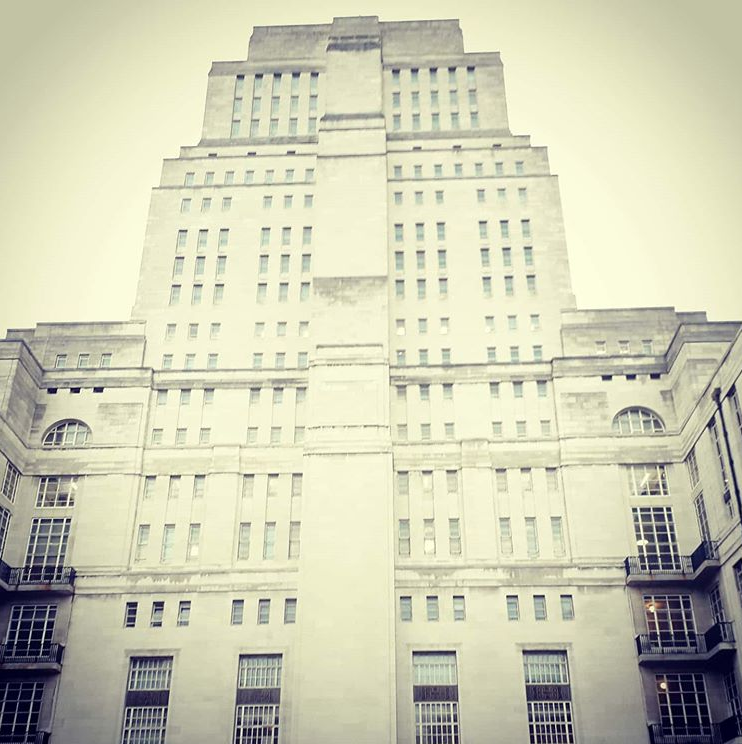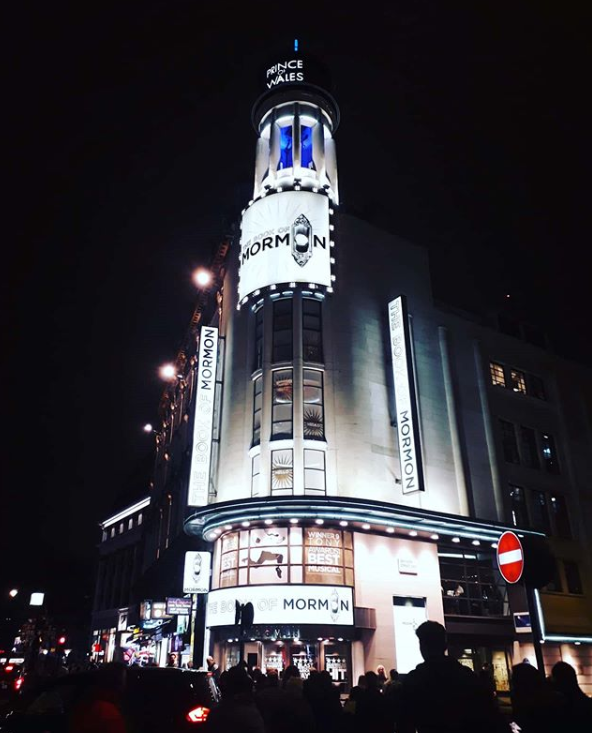Britta Jung discusses her recent trip to the IMLR through the Erasmus+ training scheme

People say you don’t know what you’ve got until it’s gone. Truth is, we did know what we had, we just never thought we would lose it. One of the things I certainly never thought I would lose is the ability to move with relative ease within my community, city and country, and indeed beyond. To visit family and friends. To engage and discuss with my students and colleagues face to face. As the COVID-19 pandemic continues to hold the world in a stranglehold and – as the CCTV images of the world’s usually boisterous cities and metropoles all too well illustrate – brings it to a standstill I, like so many others, scramble to adapt to the circumstances professionally as well as personally. I also happen to be thinking back to those precious few days at the end of January when an Erasmus+ Staff Training brought me to the Institute of Modern Language Research. It was meant to kick off a rather full travel and research itinerary for 2020. While I might not have known at the time that my other plans would fall through and I would get a crash course in digital literacy, I did know how fortunate I was to be able to travel to London thanks to the support of the UCD Humanities Institute and the IMLR, the generous Erasmus+ grant from the European Commission and the relative ease with which I can travel throughout the world on my German passport – the latter being particularly relevant given the short notice on which the trip was planned. But I will come back to that in a minute.
Generally speaking, my work thrives on close, personal interaction with my students and peers, and many projects and articles have been the result of this (I am clearly not one to live up to the imagery of the solitary academic working away in their quiet attic room). It has also very much shaped the way I teach and mentor students. Personal interaction serves as both an inspiration and a sounding board, it helps me to change gear and look at things from a different perspective, and it grants me access to specialist knowledge and cultural layers of meaning I might have previously been unaware of, particularly as the scope of my research and academic work continues to extend beyond disciplinary and national borders. Indeed, my time at the IMLR afforded me – among other things – the opportunity to reflect on the, at times subtle, at other times less subtle, differences between the Irish, British and German academic culture and student supervision.
But how did this particular Erasmus+ training come about? What did it mean to achieve? And why was it so hastened?
The UCD Humanities Institute and the IMLR’s Erasmus+ programme was established over a year ago to further strengthen our longstanding partnership; two conference have been run under its auspices and a lively exchange of ideas has taken place since. In this context, Dr Godela Weiss-Sussex (Acting Director of the IMLR) and I have been planning to undertake a teaching-based exchange for some time now. However, as I found myself tied up in an applied research project for the Higher Education Authority and teaching commitments at UCD, the exchange kept being pushed back. It was only the results of last December’s general election and the increasing uncertainty around the UK’s future involvement in the Erasmus+ programme and its general relationship with the EU that set the wheels in motion. Given the lack of definite answers on what the UK’s departure of the European Union would mean in terms of Erasmus+ mobilities from February onwards, time was suddenly of the essence. In a joint effort, that was further complicated by the imminent Christmas break, we came up with an exciting and meaningful new plan for the exchange, shifting its focus from teaching to training and career development. The flurry of emails and signatures lasted well into the new year and I finally was able to book my flight the week before I left for London.
As I boarded the plane, I hoped that I would not be the last member of either institution to embark on such an Erasmus+ training, that the UK would continue to participate in the EU’s flagship programme after the transition period ends and allow students and staff to benefit from the existing infrastructure and mutual exchange. It would certainly not be an exaggeration to say that Erasmus programme has played a huge part in my life. I would probably not even be in Dublin right now, working on my second monograph and said applied research project, without my first Erasmus student exchange to the Netherlands back in the early 2000s. After all, it was during that sojourn that I was encouraged to return after my graduation in Germany and pursue a PhD. It has been more than a decade and a half since I last ‘went on Erasmus’ and, by all accounts, my training at the IMLR proved once again an enriching and inspiring experience. My three days at the IMLR afforded me not only the opportunity to consolidate and further establish professional links with individual members of the Institute but also to share my own expertise in Migration Studies and gain new knowledge in a wide range of theories and methodologies, including Postcolonial Studies and Gender Studies as well as the Digital Humanities and Empirical Research.
A personal highlight, however, was the shadowing of Dr Godela Weiss-Sussex during her meetings with two PhD candidates, one of whom had just started their PhD journey while the other was passing the final milestones before coming to an end. As I still have very little personal experience with supervising PhD candidates due to the nature of my Fellowships, the meetings allowed me to step back from my own experiences as a supervisee and to observe the needs and interactions from a more neutral point of view. Together Dr Weiss-Sussex and I reflected on the nature of supervision, its challenges and changes over time as well as – as previously mentioned – the cultural differences between Ireland, the United Kingdom and Germany. For instance, we discussed the effects of the internationalisation of higher education and implementation of tighter procedures in many institutions as well as the notion of the German terms ‘Doktormutter’ or ‘Doktorvater’ which imply a highly personal supervisor/supervisee-relationship, whereas this relationship is in fact traditionally characterised by a decidedly less hands-on supervision than in the UK and Ireland. These first-hand experiences and reflections provided a starting point for a series of career development workshops on research supervision that I will be following at UCD once this pandemic is over and we return to relative normalcy. I also enjoyed reading and providing my own feedback on the chapters under discussion in the supervision meetings and would hereby like to – once again – extend heartfelt thanks to both PhD candidates for sharing this part of their work with me.
Another highlight was my session with Dr Naomi Wells who took it onto herself to slowly walk me through the rather expansive field of the Digital Humanities. It was a fascinating session that not only introduced me to the general field and its concepts (I have to admit that my mind was blown on one occasion or two) but also to Dr Wells’ own research which focuses on languages and migrant communities and therefore echoes to some extent my own work on migration literature and transcultural encounters. The discussion was lively, and I am sure there are future avenues of collaboration to be explored. The academic exchange continued during a special session of the IMLR’s Brown Bag Seminar Series, in which various Institute PhD students, Fellows, staff and I presented our current projects and discussed their transnational/transcultural dimension.

However, as no research or work trip can be reduced to – well – work, this one too had much more to offer beyond the seminar rooms and IMLR offices. While I have been to London countless times, there’s always more to see. I explored the picturesque streets of Bloomsbury and then moved on to other areas of London. I took my obligatory picture of a crowded Piccadilly Circus and Regent Street (which I always take) and strolled by Buckingham Palace and Westminster. I also had the chance to finally take up my late sister-in-law’s recommendation to watch the Book of Mormon in the West End and I happily indulged in the many sensory offerings of London’s multi-ethnic food scene.
So, yes, as I am sitting here in my Dublin flat in the middle of a pandemic that has halted any notion of mobility beyond a radius of 2km, I fondly remember my short visit to the IMLR and what I have learned. I think more systematically about whether and how I can apply certain aspects from Postcolonial Studies and Gender Studies to my own research. I think about what I have discussed with Naomi with regard to the Digital Humanities and how to further explore the area in relation to my own work. I think about my conversations with Godela on student supervision as I try to mentor my undergraduate students through these challenging times. Oh, and I do all this listening to the Book of Mormon soundtrack (I am sorry to say pretty much on loop), while craving some fiercely good chicken tikka masala. I truly never thought I would lose the ability to just pop over to London and the IMLR, which are just an hour away by plane. So, let’s just hope we will soon get back what we have lost due to the current pandemic and that the future will indeed hold many more Erasmus+ exchanges despite the UK’s departure from the European Union.
Dr Britta Jung, University College Dublin, UCD Humanities Institute
